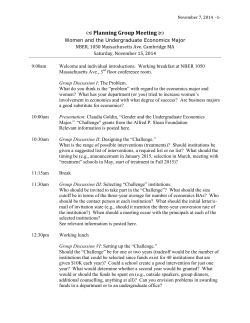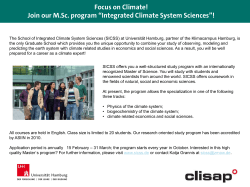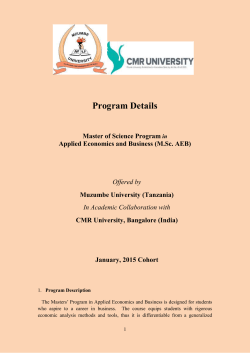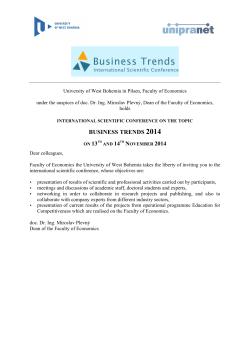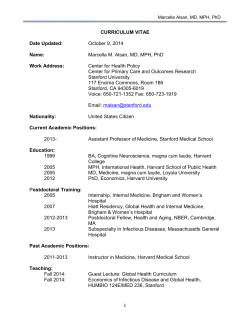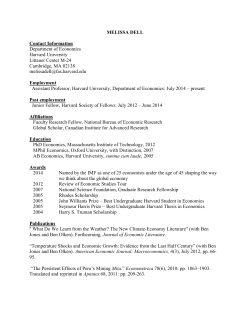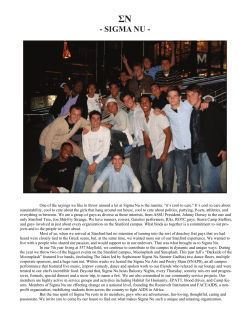
Curriculum Vitae - Stanford University
Curriculum Vitae Muriel Niederle November 2014 ADDRESS Department of Economics 579 Serra Mall Stanford University Stanford, CA 94305-6072 Phone: (650) 723-7359 Fax: (650) 725-5702 Email: niederle@stanford.edu Homepage: http://www.stanford.edu/~niederle EDUCATION Harvard University, Ph.D. in Economics: 1997- 2002. (Advisors: Alvin Roth, Drew Fudenberg and David Laibson) University of Vienna, Austria, MA in Mathematics: 1989-1994. PRINCIPAL EMPLOYMENT 9/2012 – 9/2007 – 8/2012 8/2002 – 8/2007 Professor, Department of Economics, Stanford University. Associate Professor (with tenure), Economics, Stanford University. Assistant Professor, Department of Economics, Stanford University. OTHER APPOINTMENTS 2009 – present 2002 – 2009 9-12/2006 & 4-6/2007 9/2005-6/2006 1/2001 9/96 – 2/97 7/95 – 8/97 7/94 – 6/95 National Bureau of Economic Research: Research Associate\ National Bureau of Economic Research: Faculty Research Fellow. Sabbatical, Department of Economics, Harvard University. Institute for Advanced Study, Princeton. Visitor, Department of Economics, Tel Aviv University, Israel. Visiting Scholar, Department of Economics, Boston University. Assistant Professor, Economics Department, University of Vienna, Austria. Part time Assistant Professor, Economics Department, University of Vienna, Austria. PROFESSIONAL ACTIVITIES 2009 - Associate editor of the Journal of European Economic Association. 2009 – Associate editor of Quantitative Economics. 2010 – Associate editor of the American Economic Journal - Microeconomics 2014: Mentor at CeMENT CSWEP Mentoring Workshop, January 5-7, Philadelphia. Program Committee, Summer Meetings of the Econometric Society, Northwestern, June 2003. Program Committee, Meeting of the Society for Economic Design, Mallorca, Spain, July, 2004. Program Committee, Winter Meetings of the Econometric Society, Boston, January 2006. Program Committee, Summer meetings of the Econometric Society, Boston June 2009. Program Committee, Econometric Society Winter Meetings, Atlanta, January 2010. Senior Program Committee (SPC) for the Empirical and Experimental track at ACM Conference on Economics and Computation (EC’15), June 15-19, 2015, in Portland, Oregon, as part of the Federated Computing Research Conference (FCRC). Program Committee, 2015 Econometric Society World Congress, Montreal, August 15-21, 2015. At Stanford Organizer, SITE conference on Matching Markets, Stanford, August 2003. Organizer, SITE conference on Experimental Economics, Stanford, August 2004. Organizer, Conference on Market Design (by SIEPR and KORET), Stanford, December 2004. Organizer, SITE conference on Experimental Economics, Stanford, August 2005. Organizer, Workshop on Gender Differences on the Labor Market (by Institute for Social Sciences, CDDRL, and SIEPR), November 2005 Organizer, SITE conference on Matching and Market Design, Stanford, June 2008. Organizer, SITE conference on Experimental Economics, Stanford, August 2009. Organizer, SITE conference on Experimental Economics, Stanford, August 2011. Organizer, SITE conference on Experimental Economics, Stanford, September 2012. Organizer, SITE conference on Experimental Economics, Stanford, August 2013. Organizer, SITE conference on Experimental Economics, Stanford, August 2014. REFEREEING Econometrica, Quarterly Journal of Economics, American Economic Review, Review of Economic Studies, BE Press, Operations Research Letters, Games and Economic Behavior, Journal of Labor Economics, Scandinavian Journal of Economics, Economic Letters, Journal of Economic Behavior and Organization, Binational Science Foundation (Israel – USA), Social Sciences and Humanities Research Council of Canada, National Science Foundation (NSF), TESS, Austrian Science Foundation (FWF). GRANTS and selected AWARDS Co-Principal Investigator, NSF SES – 0338619, “Market Culture,” 2004 – 2006, $193.330. Principal Investigator NSF “Collaborative Research: Gender Differences in Competitive Attitudes.” National Science Foundation CAREER Grant “Understanding how markets work in enough detail so we can fix them when they’re broken,” NSF SES – 0645728. Alfred P. Sloan Research Fellowship, 2006-2008. Eligible Fellow for the Center for Advanced Study in the Behavioral Sciences. Visiting member, Institute for Advanced Study, School of Social Science, Princeton, 2005-2006. 2 POLICY IMPACT In June 2006, the gastroenterology fellowship market rejoined the National Residency Matching Program, using a resolution proposed by Niederle, Proctor and Roth (2006). In the spring of 2006, the AEA sponsored a “scramble” for the economics junior market (the result of the AEA's Ad Hoc Committee on the Economics Job Market that I am a member of and which is chaired by Al Roth). In the fall of 2006, the AEA sponsored, for the first time, mechanism for applicants to signal their interest in up to two departments of their choice. For theoretical underpinnings, see Coles, Kushnir and Niederle (2010). This too is the result of the combined effort of the AEA's Ad Hoc Committee on the Economics Job Market. In the summer of 2009, a team including Atila Abdulkadiroglu, Clayton Featherstone, Parag Pathak, and Alvin E. Roth started working with the San Francisco Unified School District to change the assignment mechanism with which children are assigned to public schools. The new assignment was unanimously adopted by the SFUSD school board on March 9, 2010. SPECIAL LECTURES Review of Economic Studies Tour, June 2002. “The Match” Faculty: Gastroenterology (GI) Training Directors’ Workshop, Phoenix, February 4-6, 2005. “Matching,” (short course) 15th Jerusalem Summer School for Economic Theory, Institute for Advanced Studies, Hebrew University, July, 2005. Keynote speaker: Fifth International Meeting in Experimental and Behavioral Economics (IMEBE-2009) Granada, Spain, April 2009. Keynote Lecture: 26th Annual Conference of the European Society for Population Economics (ESPE), Bern, Switzerland, June 20-23, 2012. Keynote Speaker: 5th annual meeting of the French Experimental Economics Association (ASFEE), Besancon, May 22-23, 2014. Keynote Speaker: 7th "Maastricht - Behavioral and Experimental Economics Symposium" (MBEES VII: Theory and Experiments), Maastricht, June 2, 2014. Plenary Speaker, Workshop on Gender Issues in Experimental Economics, Alicante, Spain, October 27-28. 3 PUBLISHED PAPERS 1. Gneezy, Uri, Muriel Niederle, and Aldo Rustichini, “Performance in Competitive Environments: Gender Differences,” Quarterly Journal of Economics, CXVIII, August 2003, 1049 – 1074. 2. Niederle, Muriel, and Alvin E. Roth, “Relationship Between Wages and Presence of a Match in Medical Fellowships,” JAMA, Journal of the American Medical Association, vol. 290, No. 9, September 3, 2003, 1153-1154. 2.a. Niederle, Muriel, and Alvin E. Roth, “Effect of a Match on Salaries for Medical Fellows—Reply,” JAMA, Journal of the American Medical Association, vol. 290, No. 18, November 12, 2003, 2408. 3. Niederle, Muriel, and Alvin E. Roth, “Unraveling reduces mobility in a labor market: Gastroenterology with and without a centralized match,” Journal of Political Economy, vol. 111, No. 6, December 2003, 1342 – 1352. 4. Niederle, Muriel, and Alvin E. Roth, “The Gastroenterology Fellowship Match: How it failed, and why it could succeed once again”, Gastroenterology, 127, August 2004, 658-666. 4.a. Niederle, Muriel, and Alvin E. Roth, “Re-starting the Gastroenterology Match,” letter, The American Journal of Gastroenterology, 100 (5), May 2005, 1202-1203. 5. Asker, John, Brit Grosskopf, C. Nicholas McKinney, Muriel Niederle, Alvin E. Roth, and Georg Weizsäcker, “Teaching auction strategy using experiments administered via the Internet,” Journal of Economic Education, vol. 35, No. 4, Fall 2004, 330 – 342. 6. Bereby-Meyer, Yoella, and Muriel Niederle, “Fairness in Bargaining,” Journal of Economic Behavior and Organization, vol. 56, No. 2, February 2005, 173-186. 7. Niederle, Muriel, and Alvin E. Roth, “The Gastroenterology Fellowship Market: Should there be a Match?” American Economic Review Papers & Proceedings, vol. 95, No.2, May 2005, 372-375. 8. McKinney, C. Nicholas, Muriel Niederle, and Alvin E. Roth, “The collapse of a medical labor clearinghouse (and why such failures are rare),” American Economic Review, vol. 95, No.3, June 2005, 878-889. 9. Kirchsteiger, Georg, Muriel Niederle, and Jan Potters, “Endogenizing Market Institutions: An Experimental Approach”, European Economic Review, vol. 49, No. 7, October 2005, 18271853. 10. Niederle, Muriel, Deborah D. Proctor and Alvin E. Roth, “What will be needed for the new GI fellowship match to succeed?”, Gastroenterology, 130, January 2006, 218-224. 11. Niederle, Muriel, and Lise Vesterlund, “Do Women Shy Away from Competition? Do Men Compete too Much?,” Quarterly Journal of Economics, August 2007, Vol. 122, No. 3, 10671101. 12. Niederle, Muriel, “Competitive Wages in a Match with Ordered Contracts”, American Economic Review, vol. 97, December 2007, No.5, 1957 - 1969. 4 13. Harner Christopher D., Anil S. Ranawat, Muriel Niederle, Alvin E. Roth, Peter J. Stern, Shepard R. Hurwitz, William Levine, G. Paul DeRosa, Serena S. Hu, “Current State of Fellowship Hiring: Is a universal match necessary? Is it possible?”, Journal of Bone and Joint Surgery, June 2008; 90: 1375-1384. 14. Niederle, Muriel, Alvin E. Roth and Tayfun Sonmez, “Matching”, The New Palgrave Dictionary of Economics, 2nd edition, Eds. Steven N. Durlauf and Lawrence E. Blume, Palgrave Macmillan, 2008. 15. Niederle, Muriel, Deborah D. Proctor and Alvin E. Roth, “The Gastroenterology Fellowship Match – The First Two Years”, Gastroenterology, 135, August 2008, 344-346. 16. Niederle, Muriel and Lise Vesterlund, “Gender Differences in Competition”, Negotiation Journal. Volume 24, Number 4, October 2008, 447-463. 17. Niederle, Muriel, and Alvin E. Roth, “Market Culture: How Rules Governing Exploding Offers Affect Market Performance”, American Economic Journal: Microeconomics, August 2009, 2,1, 199-219. 18. Niederle, Muriel and Alvin E. Roth, “The Effects of a Central Clearinghouse on Job placement, Wages, and Hiring Practices”, in Labor Market Intermediation, David Autor, Editor, The University of Chicago Press, November 2009. 19. Niederle, Muriel and Lise Vesterlund, “Explaining the Gender Gap in Math Test Scores: The Role of Competition,” Journal of Economic Perspectives, Spring 2010, Vol 24, Number 2, 129-144. 20. Ivanov, Asen, Dan Levin and Muriel Niederle, “Can Relaxation of Beliefs Rationalize the Winner’s Curse? An Experimental Study”, Econometrica, July 2010, Vol. 78, No 4, 14351452. 21. Coles, Peter, John H. Cawley, Phillip B. Levine, Muriel Niederle, Alvin E. Roth, and John J. Siegfried, “The Job Market for New Economists: A Market Design Perspective,” Journal of Economic Perspectives, Fall 2010, Vol 24, Number 4, 187–206. 22. Niederle, Muriel “Intelligent Design,” in The Methods of Modern Experimental Economics, Guillaume Fréchette and Andrew Schotter (editors), Oxford University Press, forthcoming. 23. Niederle, Muriel and Lise Vesterlund, “Gender and Competition”, Annual Review in Economics, 2011, 3, 601–30. 24. Niederle, Muriel, Carmit Segal, and Lise Vesterlund, “How Costly is Diversity? Affirmative Action in Light of Gender Differences in Competitiveness”, Management Science, 2013, Vol. 59, No. 1, 1–16. 25. Coles, Peter, Alexey Kushnir and Muriel Niederle, “Signaling in Matching Markets”, American Economic Journal, Microeconomics, 2013, 5(2): 99–134. 26. Niederle, Muriel, Alvin E. Roth and M. Utku Ünver, “Unraveling Results from Comparable Demand and Supply: An Experimental Investigation”, Games, Special Issue: Games and Matching Markets, 2013, 4(2), 243-282. 5 27. Buser, Thomas, Muriel Niederle, and Hessel Oosterbeek, “Gender, Competitiveness, and Career Choices, Quarterly Journal of Economics, August 2014, 129 (3): 1409-1447. 28. Lee Soohyung, Muriel Niederle and Namwook Kang, “Do single-sex schools make girls more competitive?” Economics Letters, Volume 124, Issue 3, September 2014, Pages 474– 477. 29. Niederle, Muriel and Alvin E. Roth, “Philanthropically Funded Heroism Awards for Kidney Donors?” forthcoming in Law & Contemporary Problems, 77:3, 2014. 30. Augenblick, Ned, Muriel Niederle and Charles Sprenger, “Working Over Time: Dynamic Inconsistency in Real Effort Tasks”, conditionally accepted, Quarterly Journal of Economics. 31. Niederle, Muriel, “Gender” Handbook in Experimental Economics, second edition, Eds. John Kagel and Alvin E. Roth, forthcoming. 32. Lee, Soohyung and Muriel Niederle, “Propose with a Rose? Signaling in Internet Dating Markets,” conditionally accepted, Experimental Economics. WORKING PAPERS 33. Featherstone, Clayton and Muriel Niederle, “Improving on Strategy-Proof School Choice Mechanisms: An Experimental Investigation”, July, 2013, revise and resubmit, Games and Economic Behavior. 34. Mobius, Markus M., Muriel Niederle, Paul Niehaus and Tanya Rosenblat, “Managing SelfConfidence: Theory and Experimental Evidence”, August 2014, submitted. 35. Coffman, Lucas C. and Muriel Niederle, “Pre-Analysis Plans are not the Solution, Replications Might Be,” solicited by the Journal of Economic Perspectives. 36. Coffman, Lucas C. and Muriel Niederle. “A Proposal for Promoting Replications: The Case of Experimental Economics,” in preparation for the Journal of the Economic Science Association. 37. Fragiadakis, Daniel E., Daniel T. Knoepfle and Muriel Niederle, “Identifying Predictable Players: Relating Behavioral Types and Predictable Subjects”, December 2013. 38. Niederle, Muriel and Alexandra H. Yestrumskas, “Gender Differences in Seeking Challenges: The Role of Institutions”, February 2008. 39. Niederle, Muriel and Leeat Yariv, “Decentralized Matching with Aligned Preferences”, August 2009. 6 WORK IN PROGRESS 40. Andersen, Steffen, Muriel Niederle and Lise Vesterlund, “Buying High and Selling Low: Women’s Negotiation Skills in the Housing Market”. 41. Exley, Christine L., Muriel Niederle and Lise Vesterlund, “Should Women always Negotiate?” 42. Mobius, Markus M., Muriel Niederle, Paul Niehaus and Tanya Rosenblat, “Gender Differences in Confidence”. PRESENTATIONS (Seminars and Conferences) 2000: Economic Science Association, New York, June; First World Congress of the Game Theory Society, Bilbao, Spain, July; Economic Science Association, Tucson Arizona, September; Workshop in Experimental Economics, 20th Arne Ryde Symposium, Lund, Sweden, November; University of Vienna, Vienna, Austria, November. 2001: Hebrew University, Jerusalem, Israel, January; Tel Aviv University, Tel Aviv, Israel, January; Technion, Haifa, Israel, January; Carnegie Mellon University, Pittsburgh, October; University of Pittsburgh, Pittsburgh, October; Ohio State University, Columbus, October; Penn State University, State College, October; New York University, New York, November. 2002: Allied Social Science Association, Atlanta, January; University of Chicago GSB, Chicago, January; UCLA, Los Angeles, January; Stanford and Stanford GSB, Palo Alto, January; CalTech, Pasadena, January; Columbia University, New York, January; Northwestern University, Evanston, February; University of Texas at Austin, Austin, February; UCSD, San Diego, February; University of Toronto, Canada, May; Economic Science Association, Boston, June; University of California, Berkeley, November; Case Western Reserve University, Cleveland, November; Harvard Business School, Boston, November. 2003: NBER Labor Studies Program Meeting, Boston, April; University of Vienna, Vienna, Austria, April; Workshop (The Design of Organizations and Markets: An Experimental Approach), CWRU, May; Econometric Society Summer Meeting, Evanston, June; The 14th Summer Festival on Game Theory at Stony Brook, New York, July; SITE Conference on Matching, August; University of Pittsburgh, Pittsburgh, September; UCLA, Los Angeles, October; Economic Science Association, Tucson, Arizona, November. 2004: Harvard University, Massachusetts, March; University of Maryland, Maryland, April; North American Summer Meeting of the Econometric Society, Brown, June; University of Innsbruck, Austria, June; Society for Economic Design Conference, Mallorca, July; Second World Congress of the Game Theory Society, Marseille, France, July; SITE Conference on Experimental Economics, Stanford, August; Market Design Conference, Stanford, December. 2005: American Economic Association, Philadelphia, January; University of Oregon, Oregon, February; University of Pittsburgh, Pennsylvania, February; Ohio State University, Ohio, April; NBER Labor Studies Program Meeting, Boston, April; Harvard University, Massachusetts, April; Rational Choice Theory and the Humanities Conference, California, April; UC Santa Cruz, California, May; New York University, September; One-day Research Seminar on “Gender and 7 Negotiation" at the Kennedy School of Government, Massachusetts, October; Wharton Business School, October; Yale Law School, October; Princeton University, NJ, November; Workshop on Gender Differences on the Labor Market, Stanford, November; SEA meetings, DC, November. 2006: Institute for Advanced Study, Princeton, January; Baylor College of Medicine, Houston, Texas, February; Psychology Department, Stanford, February; UC Davis, California, March; CalTech, Pasadena, March; University of Michigan, STIET, Michigan, March; Ohio State University, Ohio, March; Brown University, Providence, Rhode Island, April; Workshop: “Life at the Top: The Career Trajectories of Female Professionals” Radcliff Institute for Advanced Study, Cambridge, Massachusetts, May; Oxford University, UK, June: University of York, UK, June; Conference in Game Theory, Stony Brook, July; Econometric Society European Meeting, Vienna, August; European Economic Association, Vienna, August; ESA conference, Tucson, Arizona, September; Harvard University, Massachusetts, October; University of Chicago, November; University of Michigan, November. 2007: Texas A&M, Texas, February; MEDS, Chicago, March; Stanford, CA, March; UCSD, CA, March; NBER Labor Meeting, April, Boston; NBER Labor Market Intermediaries Conference, May, Boston; American Orthopedic Association, June; Western Economic Association June 29July 3 Seattle; Stony Brook game theory festival, July 14-16, Stony Brook; University of Pittsburgh, September 20; Society for Neuroeconomics Conference, September 27-30, Nantasket; Clayman Institute Lunch Seminar, October 24, Stanford; Research Seminar on “Gender and Negotiation” at the Kennedy School of Government, Massachusetts, November 1-2; Harvard and MIT Theory Seminar, Boston, November 8; University of Washington, Seattle, November 29; University of Victoria, Canada, November 30. 2008: Workshop on Matching, Caltech, February 29-March 2nd; The American Academy of Orthopaedic Surgeons 75th Annual Meeting, San Francisco, CA, March 5-9, 2008; Labor and Behavioral Workshop, Cornell, March 10; Conference on the Methods of Modern Experimental Economics, April 27-28, NYU, New York; Society of Labor Economists Meeting (SOLE), May 9-10, Columbia University, New York; Mini-conference on “Universities, Careers, and Women” September 19 at Columbia University, New York; University of Pennsylvania, Philadelphia, November 4; ESA conference, Tucson, November 13 – 15; University of Maryland, November 18. 2009: Fifth International Meeting in Experimental and Behavioral Economics (IMEBE-2009) Granada, April 2-4; Harvard University, Boston, April 28; SITE, Experimental Economics, August 6 – 8; Amsterdam Workshop on Behavioral and Experimental Economics (ABEE09), September 4-6, 2009; Conference on the Methods of Modern Experimental Economics, October 23 -24, NYU, New York, North American ESA Conference, Tucson, AZ Nov 12-14, 2009. 2010: North American winter meetings of the Econometric Society, Atlanta, January 3-5; Experimental/behavioral conference, Santa Barbara, February 5-6; Berkeley, March 9; Harvard, March 30; Celebration Conference: 20 years Roth-Sotomayor, Duke, May 7-9; Behavioral and Quantitative Game Theory: Conference on Future Directions, May 14 - 16, 2010 in Newport Beach, CA; Experimental Economics Handbook conference, June 17-19, Boston; 'Education policies: empirics and design' in Leuven, June, 24-25, 2010; New Directions in Applied Microeconomics, La Pietra, Florence, Italy, July 18-20; MOVE Conference on Gender Differences in Competitiveness and Risk Taking, Barcelona, 6-7 September; 10/8-10/9 – NBER Market Design Working Group Meeting, Boston; Advances with Field Experiments, Wharton, UPenn, October 15/16; Seminar at Booth Chicago Business School, October 20; UC Santa Barbara, October 25; Princeton University, November 9; ESA Tucson, November 11-13. 8 2011: Boston Fed, Boston, April; George Mason University, Virginia, April 15; MFI conference: “Matching and Price Theory”, May 6-7, Chicago; Workshop on Gender and Competition, University of Innsbruck, Austria, 18-20 May; 19th Annual Conference of the WZB on Markets and Politics on “Cheap Talk and Signaling”, June 17-18; Berlin-wide Behavioral Economics Seminar June 23; Applied Seminar, Vienna, Austria, June 30; Workshop on “Experimental Labor Economics July 14-15, Vienna, Austria; SITE conference in Experimental Economics, September 16-18, Stanford; Advances with Field Experiments conference, October 28-29, Chicago. 2012: UC Davis, Davis, April; Bay Area Behavioral and Experimental Economics Workshop (BABEEW) May 4-5, Santa Clara; Keynote Lecture: 26th Annual Conference of the European Society for Population Economics (ESPE), Switzerland, June 20-23, 2012, Bern; MSR, Boston, August 22; NYU economics, New York, September 27; Harvard University, October 16; Ohio State University, Columbus, Ohio, October 18; NBER Labor Meeting, Boston, October 26; Conference on “decision making and emotion regulation in life-span transitions”, Berkeley, November 8-9; University of Stockholm, Sweden, December 5, planned; Stockholm School of Economics, Sweden, December 6, planned; University of Copenhagen, Denmark, December 12. 2013: Stanford Women's Community Center (WCC), Stanford, January 24; UC Berkeley, Berkeley, February 19; UC Irvine, Irvine, April 2; BABEEW: Bay Area Behavioral and Experimental Economics Workshop, University of San Francisco, May 4; Workshop in Mechanism Design: Matching, Paris, June 11-12; MSE, Paris un, June 13; “Behavioural Organizational Economics” IZA, Bonn, 17-18 June; Applied Microeconomics and Organization seminar, Goethe University in Frankfurt, June 19; Keynote talk to Behavioral Economics, Wirtschaftsuniversität Wien, Wien, June 20; Kolloquium von WZB und TU, Berlin, June 26; Workshop on Experimental Economics, Stony Brook, New York, July 14-15; Program On Negotiation at Harvard Law School and the Harvard Kennedy School's Women and Public Policy Program, October 3; ESA Santa Cruz, October 25-26; Annual Meeting of the Society for Neuroscience, Sunday November 10; UC San Diego, Rady Business School, November 13; Duke, Microeconomics Seminar, November 18; Duke, November 20, planned; University of Munich, Germany, November 25; Mannheim University, Germany, November 26; University of Bonn, Germany, December 13; Max Planck Institute, Bonn, December 16; University of Amsterdam, December 18; University of Zuerich, December 20. 2014: Experimental Methods in Policy, Curacao, February 15 – 18; SBEE (social, behavioral and experimental economics) seminar, University of Michigan, March 24; LABEL at USC, April 17; 5th annual meeting of the French Experimental Economics Association (ASFEE), Besancon, May 22-23; 7th "Maastricht - Behavioral and Experimental Economics Symposium" (M-BEES VII: Theory and Experiments), Maastricht, June 2; University of Nottingham, June 4th; Frontiers in Economics and Psychology, at University College London, London, 5-6 June; Workshop for Manfred Nermuth, Wien, June 13; VCEE-Seminar, University of Vienna, Vienna, June 20; SITE conference in Experimental Economics, August; Conference on women and the workplace (tentatively titled, Navigating the Labyrinth), Pittsburgh, September 5; Seminar, Minneapolis Fed, Minnesota, September 9; ESA North American meeting, Fort Lauderdale, Florida, October 16-18; Workshop on Gender Issues in Experimental Economics, Alicante, Spain, October 27-28; UPF seminar, joint with Labor, October 28; Universitat Autonoma de Barcelona, seminar, October 29; Conference in Caltech, November 7-8; Psychology and Economics seminar at LSE, December 9, planned; Behavioral Game Theory conference, UCL, London, 12-13 December, planned. 9 2015: “Typologies of Boundedly rational Agents: Experimental Approach,” Cancun, February 38: planned; Wharton Applied Economics Workshop, March 23, planned; University of Pittsburgh, March 27, planned; UCLA, joint theory and applied micro seminar, June 4, planned; Mishknaot Shaananim, Jerusalem, Israel, June 29-30, planned; Econometric Society World Congress, Montreal, August 15-21, planned. Other talks: "Women in the Workplace – Perspectives from the Academy and the Corporate World" March 12-13, Chicago. NEWS COVERAGE OF MY WORK (select) 1. Business Week “Are Women Less Competitive?,” Economic Trends, by Gene Koretz, December 9, 2002. 2. The Economist, “Be a man,” June 28, 2003, (and subsequently in many other newspapers, radio shows and webforums). 3. American Medical News, “Harvard economist argues that Match is not anticompetitive”, September 13, 2003. 4. Harvard Murmur Weekly, Opinion, December 8, 2003. 5. New York Times, “Tweaking the Math to Make Happier Medical Marriages,” Sara Robison, August 24, 2004. 6. The Niederle and Roth, JAMA 2003 paper also receives some advertisement through webpages of the American Medical Association that inform about the process of the class action lawsuit (e.g. http://www.ama-assn.org/ama/pub/category/11015.html), and the webpage http://www.savethematch.org/ put together by the NRMP to, well, save the match… 7. New York Times, “What Women Want,” Column by John Tierney, May 24, 2005 (discussed in many other newspapers and forums and radio shows). 8. The Niederle and Vesterlund 2005 working paper was even used in a Submission to the Senate’s Employment, Workplace Relations and Education Legislation Committee's Inquiry into the Workplace Relations Amendment (WorkChoices) Bill 2005 in Australia: http://www.hreoc.gov.au/legal/submissions/workplace_relations_amendment_2005.html 9. Sydney Morning Herald, “Office warriors reign supreme in battle of sexes”, October 1, 2005. 10. Knowledge@Wharton, “Do Women Shy Away from Competition, Even When They Can Win?”, November 2, 2005 (and another life performance at the radio show Business Shrink). 11. Time Magazine, “Ambition: Why Some People Are Most Likely To Succeed,” Jeffrey Kluger, November 14, 2005. 12. The Age, “Men lead because they reckon they're the best,” Ross Gittins, October 1, 2005 13. Fitness magazine, “How to Win at Everything: The Rules of Healthy Competition”, by Marguerite Lamb, January 2006. 14. The NBER Digest, “Do Women Shy Away from Competition”, February 2006. 15. New York Times, “ECONOMIC SCENE; The Difference Between Men and Women, Revisited: It's About Competition” Hal R. Varian, March 9, 2006. 16. Cosmopolitan, March 2006, planned. 17. TCS Daily, “Legal Sex Tournaments,” Stephen Bainbridge, 06 Apr 2006. 18. Pittsburgh Post-Gazette, “The Thinkers: Studies show women don't savor competition and suffer as a result”, Mark Roth, Monday, April 24, 2006, 19. Health magazine, “Play to Win”, Joe Treen, June 2006. 10 20. The Wall Street Journal, “Economists Learn Matchmaker Role”, by Mark Whitehouse, January 8, 2007. 21. Slate, “Women Are Chokers: Studies show they cave under pressure. Why?”, By Steven E. Landsburg, Friday, Feb. 9, 2007. 22. Forbes Magazine, “Cupid and Colleges”, by Ian Ayres and Barry Nalebuff, Mai 21. 2007. 23. The NBER Digest , “Gender Differences: The Role of Institutions”, August 2008. 24. The Guardian, “It's not cricket, but economics ought to be a game of two sexes, Heather Stewart, The Observer, The Guardian, Sunday 19 August 2007. 25. Inside Higher Education, New Questions on Women, Academe and Careers, by Scott Jaschik, September 22, 2008. 26. Handelsblatt, “Quotenfrauen sind besser als ihr Ruf”, 08.12.2008 by Norbert Häring. 27. BusinessWeek online, The Needs of the Global Economy Workforce, Armelle Carminati, November 25, 2008. 28. The Washington Post, “One Gender’s crash” by Debora Spar, Sunday, January 4, 2009. 29. The Canberra Times, “Someone for everyone, if you get your signals right,” Kevin Hassett, 12/02/2009. 30. Slate, “Are Men More Competitive Than Women? Don't bet on it”, By Ray Fisman Friday, Nov. 13, 2009. 31. Slate, “Will You Accept This Digital Rose? How little flower icons could solve Internet dating’s biggest problem”, By Ray Fisman, Feb. 13, 2012. 32. Les Affaires, blog, “À quoi bon faire des heures supplémentaires?”, Olivier Schmouker, 13 February, 2013. 33. Science Careers, “The Complexity of Gender Differences in Choosing STEM”, Beryl Lieff Benderly, March 1, 2013. 34. Time Opinion, “Leaning In Won’t Fix the Gender Gap (Yet)”, Uri Gneezy and Katie Baca-Motes, March 10, 2014. 35. New York Times: ECONOMIC VIEW: The upshot: “Possible Path to Closing Pay Gap” by Sendhil Mullainathan, May 10, 2014. TEACHING Stanford University: Graduate: Market Design Experimental Economics Experimental Economics and Economics and Psychology Undergraduate: Experimental Economics Undergraduate honors theses: 2004: Alexandra Yestrumskas: (now a law student): “Should I choose the harder path? Gender differences in an experiment on task choice”. She won the Anna Laura Myers Prize for her thesis! 2005: Kalikolehua Hurley (now a law student): “A Follow-up Experimental Analysis of Gender Differences in Performance in Competitive Environments.” 2005: Krishna Savani (now a psychology graduate student at Stanford): “Essays in Experimental Economics.” 11 Graduate Students (Principal Advisor, Co-Advisor or letter writer) and first jobs: 2005: Peter Coles: Harvard Business School. 2005: John Hatfield: Stanford Business School. 2005: Carmit Segal: First 2 year post-doc with Alvin Roth at Harvard Business School, then at Pompeu Fabra in Barcelona, Spain. 2007: Yuan-Chuan Lien: A 2 year post-doc at Caltech. 2008: Scott Nicholson: Private Sector. 2009: Annika Todd: Post Doc in Precourt Energy Efficiency Center, Stanford. 2009: James McGuire: Private Sector. 2010: Ned Augenblick: Haas Berkeley. 2010: Clayton Featherstone: postdoc at Harvard Business School, then Wharton. 2010: Lucas Coffman (Harvard): Ohio State University. 2010: Alexey Kushnir (Penn State): University of Zurich. 2010: Marie-Pierre Dargnies (Paris 1): postdoc in Berlin. 2011: Tomás Barraquer: Postdoc at EUI. 2011: Matthew Elliott: Caltech, after 1 year postdoc at MSR. 2011: Eric Mayefsky: Facebook. 2012: Mustafa Oguz Afacan: Sabanci University. 2012: Thomas Buser (University of Amsterdam): University of Amsterdam. 2013: Xu Tan: University of Washington. 2014: Daniel Fragiadakis: Texas A&M. 2014: Pete Troyan: University of Virginia. Current Students Christine Exley Jeff Naecker Sandro Ambuehl Shengwu Li Hannu Kivimäki 12
© Copyright 2025

